 Petzlover
Petzlover Australian Stumpy Tail Cattle Dog is originated from Australia but Muggin is originated from United States. Australian Stumpy Tail Cattle Dog may grow 37 cm / 15 inches higher than Muggin. Both Australian Stumpy Tail Cattle Dog and Muggin are having almost same weight. Both Australian Stumpy Tail Cattle Dog and Muggin has same life span. Both Australian Stumpy Tail Cattle Dog and Muggin has almost same litter size. Australian Stumpy Tail Cattle Dog requires Moderate Maintenance. But Muggin requires High Maintenance
Australian Stumpy Tail Cattle Dog is originated from Australia but Muggin is originated from United States. Australian Stumpy Tail Cattle Dog may grow 37 cm / 15 inches higher than Muggin. Both Australian Stumpy Tail Cattle Dog and Muggin are having almost same weight. Both Australian Stumpy Tail Cattle Dog and Muggin has same life span. Both Australian Stumpy Tail Cattle Dog and Muggin has almost same litter size. Australian Stumpy Tail Cattle Dog requires Moderate Maintenance. But Muggin requires High Maintenance
 There is quite a bit of mystery surrounding the origin of the Stumpy Tail Cattle Dog. The breed was developed as a working dog to herd sheep and cattle, but there are quite a few theories about the development of the breed. It is agreed however, that the dog was developed in Australia and came about from crossing the Australian Dingo and British herding dogs.
There is quite a bit of mystery surrounding the origin of the Stumpy Tail Cattle Dog. The breed was developed as a working dog to herd sheep and cattle, but there are quite a few theories about the development of the breed. It is agreed however, that the dog was developed in Australia and came about from crossing the Australian Dingo and British herding dogs.
Perhaps the most popular theory for the origin of the Australian Stumpy Tail Cattle Dog is that the breed was developed by a man named Timmins, sheep drover and a cattle operating in New South Wales during the colonial period. Whatever the dog’s origins, it was in 1996 that the United Kennel Club, the 2nd largest dog registry in the world and the United States, granted full recognition to the Stumpy Tail Cattle Dog as a member of the Herding Group. The breed’s name was changed to the Australian Stumpy Tail Cattle Dog in 2002. Today he remains almost exclusively a tail-less working dog.
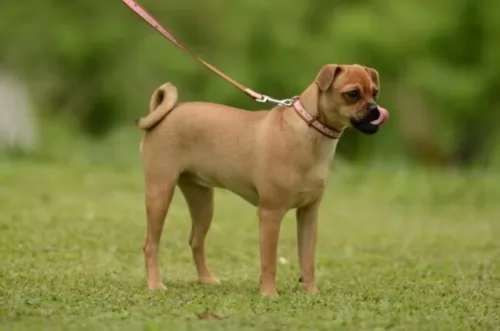 The Muggin is not a purebred dog but rather a cross breed. The hybrid dog population has exploding in the United States in the past ten to fifteen years. A lot of the success of crossbreeding can be attributed to the marketing of these dogs as “Designer Breeds”.
The Muggin is not a purebred dog but rather a cross breed. The hybrid dog population has exploding in the United States in the past ten to fifteen years. A lot of the success of crossbreeding can be attributed to the marketing of these dogs as “Designer Breeds”.
Designer breeds are developed because someone wants some of the characteristics of Breed X and some of the characteristics of Breed Y. Therefore, Designer breed XY is developed. In order to understand this hybrid dog, you need to understand the two purebred breeds they come from. The Muggin is the result of crossing the purebred Pug and the purebred Miniature Pinscher or Min Pin. So, we need to look at the origins of these two purebred breeds.
They are also referred to as Pin Pugs, Min Pin Pug, Pug Pin, Pugscher and were originally the Carlin Pinscher. However, these days there are other breeds besides the Pug and Min Pin making up the gene pool for the Carlin Pinscher. Because of this the Muggin has been separated from the Carlin Pinscher. The American Canine Hybrid Club has accepted the Muggin name for the Pug Min Pin cross.
Pugs are originally a Chinese breed and they were companions rather than working dogs of any kind. During the Han Dynasty they were the dogs of royalty. At the same time there were dogs very much like the pug in Japan and Tibet. The Pugs came to Europe by way of trades with the Dutch who then brought them to Europe. They were named the Mopshond and they caught the eye of the royalty in Europe as well.
Pugs were imported to the United States after the U.S. Civil War and in 1885 they were recognized by the American Kennel Club and called Pugs.
The Min Pin traces its origins to Germany a few hundred years ago. They were “ratters”, guarding the house and stables from all types of vermin. Most dog people believe that the Min Pin is much older than this, perhaps by thousands of years. Yet there is no detailed history to support that. Most believe the breed comes from the German Pinscher line. There might also be some Daschund and Greyhound in that line.
They were once called the Reh Pinscher. This was their name when they came to North America in 1919 and then the breed was renamed in 1972. The Miniature Pinscher Club of America was started in the early 1900’s while the AKC recognized the Min Pin in 1929. Today the Miniature Pinscher is a family dog, a companion.
The Muggin is a loving and loyal dog. All they want is for you to be happy and to share that happiness with them. They can also easily become a one person dog and bond intensely with that one person. They are not a hybrid that you can leave home alone while you go to work for 8 to 10 hours a day. No, the Muggin needs attention and lots of it. Despite this they are great with both kids and other dogs.
Because they are a cross breed, they are not recognized by the American Kennel Club. However, some hybrid registries do recognize the Muggin. These include the Designer Breed Registry, the International Designer Canine Registry, The Designer Dogs Kennel Club, the American Canine Hybrid Club, and the Dog Registry of America.
 An interesting fact about the Australian Stumpy Tail Cattle Dog is that he is naturally tail-less so no tail docking has been required for this naturally bobtailed dog. He is medium-sized to large-sized with his most distinctive feature being the lack of a tail. The coat of the dog is short to medium length, dense and straight. Another interesting aspect is that the coat color is a speckled blue or speckled red.
An interesting fact about the Australian Stumpy Tail Cattle Dog is that he is naturally tail-less so no tail docking has been required for this naturally bobtailed dog. He is medium-sized to large-sized with his most distinctive feature being the lack of a tail. The coat of the dog is short to medium length, dense and straight. Another interesting aspect is that the coat color is a speckled blue or speckled red.
Height of the dog is 46–51 centimetres at the withers the dog is normally squarely proportioned with long legs and pricked ears. The dog has no exaggerated features and what you see is what you get – a plain, hard-working dog which is fit and muscular. He is equally long from chest to rump as he is from the ground to the shoulder.
The muzzle of the dog is of average length, but fairly broad and the nose is always black. The dog is intelligent, alert and also mischievous and he makes a good pet. With proper socialization, he’ll get on well with children they know and who treat them with kindness. He is alert and makes a very good watchdog, being fairly territorial.
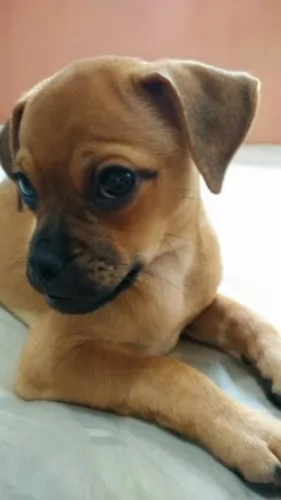 As previously mentioned, the Muggin is a cross between the Pug and the Miniature Pinscher. They are small, shave sturdy legs, floppy ears, and a wrinkled forehead for the most part. Like all hybrids however, all first generation dogs do not look the same. Some might resemble the Min Pin more and others the Pug. Some might have the stockier body of the Pug and the short tail of the Min Pin. Or one could have the Pug’s curly tail and the athletic body of the Min Pin. The snout can be short or long, the ears heavy and floppy or small and thin.
As previously mentioned, the Muggin is a cross between the Pug and the Miniature Pinscher. They are small, shave sturdy legs, floppy ears, and a wrinkled forehead for the most part. Like all hybrids however, all first generation dogs do not look the same. Some might resemble the Min Pin more and others the Pug. Some might have the stockier body of the Pug and the short tail of the Min Pin. Or one could have the Pug’s curly tail and the athletic body of the Min Pin. The snout can be short or long, the ears heavy and floppy or small and thin.
Their coats will usually be fine and short, and colors can vary a lot. They might be black and tan like a Min Pin, or more like a Pug with a solid color of cream, brown, black, white or golden. They also tend to shed quite a bit no matter which parent they take after the most. They will either have brown noses and black eyes or brown eyes and black noses or any combination of black and brown.
If Muggins are only bred to Muggins the second and third generations will resemble each other more than the first generations will. However, at this point many breeders will try to strengthen the breed by occasionally adding in to the gene pool other dog breeds.
 The Australian Stumpy Tail Cattle Dog is a hardy dog, capable of hardships that would take its toll on other dog breeds. He is a wonderful athlete and if you’ve got him working with your livestock, he’ll tirelessly perform his duties – small wonder he is so valued in the Australian cattle industry.
The Australian Stumpy Tail Cattle Dog is a hardy dog, capable of hardships that would take its toll on other dog breeds. He is a wonderful athlete and if you’ve got him working with your livestock, he’ll tirelessly perform his duties – small wonder he is so valued in the Australian cattle industry.
If you’re looking for a robust breed who will have all the energy needed to accompany you on all your adventures, he won’t disappoint. He is amazingly capable and always willing.
He’s a family dog and will be loving, devoted and loyal. Care should be taken with him around small children and other pets as he’s not to comfortable around them and he doesn’t tolerate strangers too well either. Train him and socialize him and you’ll have an amazing friend for life.
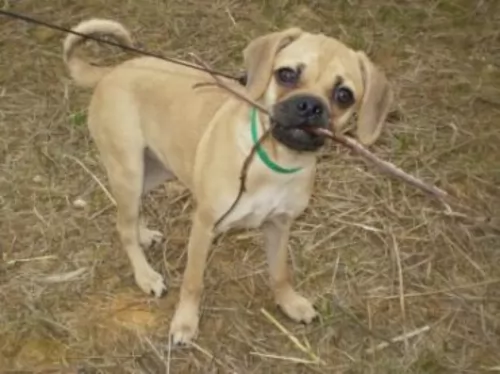 They are good with children but should be supervised.
They are good with children but should be supervised.
Energetic and loving little dogs.
Very adaptable if taken for walks or has space in a yard. Can live anywhere under those circumstances.
Very intelligent but strong willed dog. Needs strong leadership from their person.
 The Australian Stumpy Tail Cattle Dog is regarded as being an extremely healthy breed, and the average life expectancy of this breed is at least 14 to 15 years and older.
The Australian Stumpy Tail Cattle Dog is regarded as being an extremely healthy breed, and the average life expectancy of this breed is at least 14 to 15 years and older.
They don’t suffer with many genetically inherited conditions, but they are susceptible to
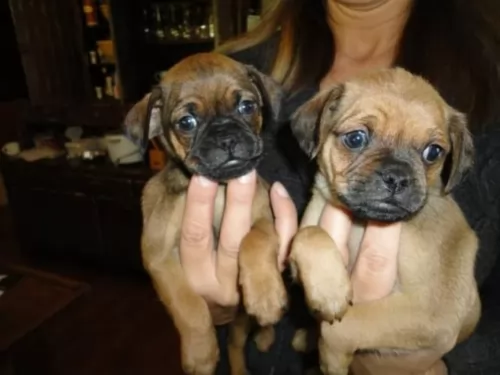 The first generation of Muggins may face all the health issues of either or both their parents, while second and third generations tend to have less health issues, They types of issues the first generation of Muggins might face include:
The first generation of Muggins may face all the health issues of either or both their parents, while second and third generations tend to have less health issues, They types of issues the first generation of Muggins might face include:
Nerve Degeneration – Degenerative Myelopathy or Dm – causes paralysis and eventually fatal.
 The beauty about the Australian Stumpy Tail Cattle Dog is that he is low to moderate maintenance. He will require a good weekly brushing as he can shed quite a bit when the season’s change and his new coat comes in. He is hypoallergenic.
The beauty about the Australian Stumpy Tail Cattle Dog is that he is low to moderate maintenance. He will require a good weekly brushing as he can shed quite a bit when the season’s change and his new coat comes in. He is hypoallergenic.
Australian Stumpy Tail Cattle Dog puppies will need 4 bowls of food over a 24 hour period Puppies from 6 months on can have 2 bowls a day. Speak to your vet about the best foods for your dog and ensure fresh, cool water is constantly available to your pet.
Don’t just feed your dog pellets continuously – mix in some raw meat and some cooked chicken and rice for variety and to ensure a shiny, glossy coat.
The Stumpy is a hugely energetic dog and he will become bored and frustrated if he doesn’t get plenty of exercise and games. Ball throwing, swimming, long walks and a run in the park will be important for the Stumpy that doesn’t live on a farm. Leaving him alone without exercise will lead to anti-social behaviour such as continuous barking, digging and chewing.
Take your Stumpy to the vet if you suspect health problems. Certainly, when you buy a puppy, make sure that he has all his vaccinations. There are certain health problems that are more common in the Australian Cattle dog and you want to do whatever it takes to ensure your dog steers clear of them.
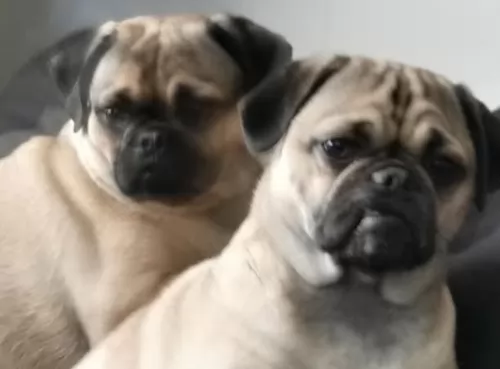 This crossbreed has a definite propensity to overeat and become obese from puppyhood. Feed the puppy a small dog dry food 3-4 times a day a total of ¾ of a cup to 1 cup.
This crossbreed has a definite propensity to overeat and become obese from puppyhood. Feed the puppy a small dog dry food 3-4 times a day a total of ¾ of a cup to 1 cup.
Again don’t over feed the adult Muggin or he will become obese easily. Feed at least twice a day one to one and half cups total.
High Energy
With the athleticism of the Min Pin taking precedence over the less active Pug, the Muggin is a fairly active dog. The Muggin is also not effective by the Pug’s difficulty with heat and cold. They love to go on long walks and need exercise to keep from being bored and destructive. However, remember there is a Pug in your Muggin and if she is not into exercise don’t try to get her to do more than she can.
You do want your Muggin to get enough exercise to fend off any tendency to be overweight. They are good at agility, jogging, obedience and watchdog activities.